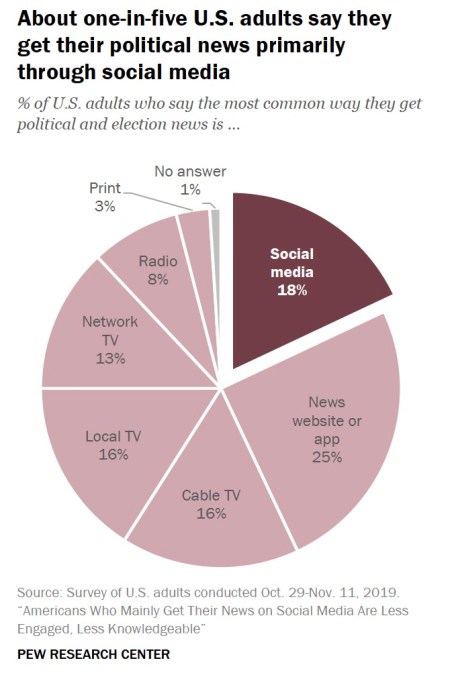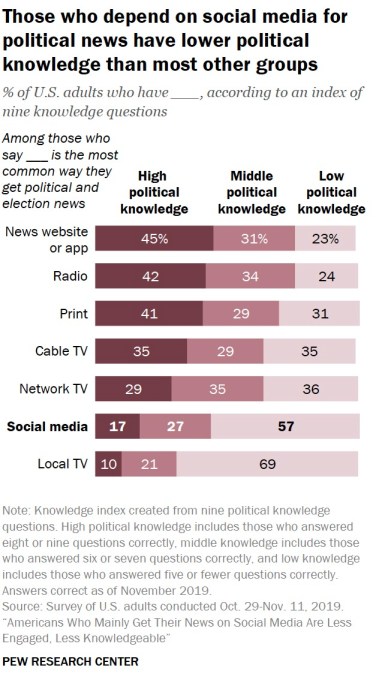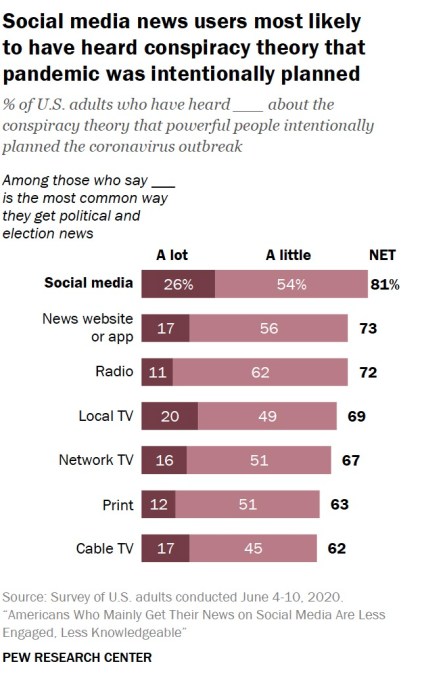Kyle Chayka calls this “ambient television,” an artifact of contemporary dystopia made for our quarantine era, when nothing’s stopping you from leaving the TV on all day long.
https://www.newyorker.com/culture/cultural-comment/emily-in-paris-and-the-rise-of-ambient-tv
+++++++++++++++
more on social media in this IMS blog
https://blog.stcloudstate.edu/ims?s=social+media
https://www.npr.org/2020/09/22/915676948/can-circuit-breakers-stop-viral-rumors-on-facebook-twitter
Critics of Facebook and Twitter — and even some people inside the companies — say dramatic action is needed to counter the way the platforms supercharge false, and sometimes dangerous, claims.
On social media, it is easy for rumors to go viral, while efforts to fact check or correct those rumors often lag behind.
Part of the reason these claims spread so widely on Facebook, in particular, is that the world’s biggest social network rewards engagement. Posts that get lots of shares, comments and likes get shown to more people, quickly amplifying their reach.
Facebook is well aware of its power to make stories go viral. As the fire rumors proliferated, the company put warnings on some posts its fact checkers had found false and reduced their distribution.
But that wasn’t enough to quell the rumors.
+++++++++++++++++++++++++++++++++++
https://www.npr.org/2020/09/25/916782712/civil-rights-groups-say-if-facebook-wont-act-on-election-misinformation-they-wil
+++++++++++++
more on social media in this IMS blog
https://blog.stcloudstate.edu/ims?s=social+media
https://www.npr.org/2020/08/13/901419012/with-more-transparency-on-election-security-a-question-looms-what-dont-we-know
a historic report last week from the nation’s top boss of counterintelligence.
the need for the United States to order the closure of the Chinese government’s consulate in Houston.
metaphor for this aspect of the spy game: a layer cake.
There’s a layer of activity that is visible to all — the actions or comments of public figures, or statements made via official channels.
Then there’s a clandestine layer that is usually visible only to another clandestine service: the work of spies being watched by other spies.
Counterintelligence officials watching Chinese intelligence activities in Houston, for example, knew the consulate was a base for efforts to steal intellectual property or recruit potential agents
And there’s at least a third layer about which the official statements raised questions: the work of spies who are operating without being detected.
The challenges of election security include its incredible breadth — every county in the United States is a potential target — and vast depth, from the prospect of cyberattacks on voter systems, to the theft of information that can then be released to embarrass a target, to the ongoing and messy war on social media over disinformation and political agitation.
Witnesses have told Congress that when Facebook and Twitter made it more difficult to create and use fake accounts to spread disinformation and amplify controversy, Russia and China began to rely more on open channels.
In 2016, Russian influencemongers posed as fake Americans and engaged with them as though they were responding to the same election alongside one another. Russian operatives even used Facebook to organize real-world campaign events across the United States.
But RT’s account on Twitter or China’s foreign ministry representatives aren’t pretending to do anything but serve as voices for Moscow or Beijing.
the offer of a $10 million bounty for information about threats to the election.
+++++++++++++++++++
more on trolls in this IMS blog
https://blog.stcloudstate.edu/ims?s=troll
Study: U.S. adults who mostly rely on social media for news are less informed, exposed to more conspiracies from r/technology
Study: US adults who mostly rely on social media for news are less informed, exposed to more conspiracies
A new report from Pew Research makes an attempt to better understand U.S. adults who get their news largely from social media platforms, and compare their understanding of current events and political knowledge to those who use other sources, like TV, radio and news publications.



Pew research: Tech experts believe social media is harming democracy from r/technology
Many Tech Experts Say Digital Disruption Will Hurt Democracy
The years of almost unfettered enthusiasm about the benefits of the internet have been followed by a period of techlash as users worry about the actors who exploit the speed, reach and complexity of the internet for harmful purposes. Over the past four years – a time of the Brexit decision in the United Kingdom, the American presidential election and a variety of other elections – the digital disruption of democracy has been a leading concern.
Some think the information and trust environment will worsen by 2030 thanks to the rise of video deepfakes, cheapfakes and other misinformation tactics.
Power Imbalance: Democracy is at risk because those with power will seek to maintain it by building systems that serve them not the masses. Too few in the general public possess enough knowledge to resist this assertion of power.
EXPLOITING DIGITAL ILLITERACY
danah boyd, principal researcher at Microsoft Research and founder of Data & Society, wrote, “The problem is that technology mirrors and magnifies the good, bad AND ugly in everyday life. And right now, we do not have the safeguards, security or policies in place to prevent manipulators from doing significant harm with the technologies designed to connect people and help spread information.”
+++++++++++++++
more on social media in this IMS blog
https://blog.stcloudstate.edu/ims?s=social+media
Leaked documents show how police used social media and private Slack channels to track George Floyd protesters from r/technology
https://www.businessinsider.com/blueleaks-how-cops-tracked-george-floyd-protesters-on-social-media-2020-6
Police monitored RSVP lists on Facebook events, shared information about Slack channels protesters were using, and cited protesters’ posts in encrypted messaging apps like Telegram.
How police used social media to track protesters
warning sent to police departments on June 6, the FBI says it’s been tracking “individuals using Facebook, Snapchat, and Instagram” who post about organizing protests.
+++++++++++++++++++
more on surveillance in this IMS blog
https://blog.stcloudstate.edu/ims?s=surveillance
Roger Stone Bought Hundreds of Fake Facebook Accounts to Promote His WikiLeaks Narrative from r/technology
https://gizmodo.com/roger-stone-bought-hundreds-of-fake-facebook-accounts-t-1843161716
The documents also reveal that Stone had run a mini-sock puppet outfit with hundreds of fake Facebook accounts
The documents claim that investigators are still unaware of what’s in his WhatsApp, Signal, Wickr, and ProtonMail logs. More importantly, what was the Swash Buckler up to?
+++++++++++++++
more on fake news in this IMS blog
https://blog.stcloudstate.edu/ims?s=%23fakenews


